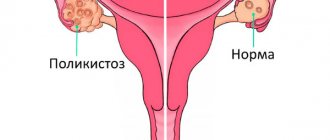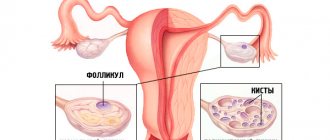Polycystic ovary syndrome is an endocrine disease caused by a violation of the regulatory function of the hypothalamus and pituitary gland on the peripheral endocrine glands (ovaries, adrenal glands). This leads to hormonal imbalance, characterized by excessive synthesis of estrogens and androgens, decreased production of the hormone progesterone, which is necessary for the normal process of ovulation.
The egg in the follicle does not mature and ovulation does not occur. This is the cause of infertility in women. The follicle does not resolve, fills with fluid and after some time turns into a cyst. This process, regularly repeated from cycle to cycle, turns the ovaries into cystic formations, hence the name of the disease - polycystic ovaries.
Reduce your carbohydrate intake
Reducing your carbohydrate intake may help control PCOS due to the effect carbohydrates have on insulin levels.
Approximately 70% of women with PCOS have insulin resistance, a condition in which cells no longer recognize the hormone insulin ().
Insulin is essential for controlling blood sugar levels and storing energy in your body. Research has linked high insulin levels to increased body fat and weight gain in the general population - and in women with PCOS (, ).
In one study, obese women with PCOS and insulin resistance first followed a 3-week diet of 40% carbohydrates and 45% fat, followed by a 3-week diet of 60% carbohydrates and 25% fat. Protein intake was 15% during each phase ().
While blood sugar levels were the same during the two phases of the diet, during the low-carb, high-fat phase, insulin levels dropped by 30%.
Moreover, a diet that includes foods with a low glycemic index can help women with PCOS. The glycemic index (GI) is a measure of how quickly a certain food raises your blood sugar levels.
In one study, women followed their normal diet for 12 weeks and then followed a low-GI diet for 12 weeks. Their insulin sensitivity scores (how efficiently the body uses insulin) were significantly better during the low GI phase ().
Summary:
Eating a low-GI, low-carbohydrate diet may lower insulin levels in women with PCOS. In turn, this can help you lose weight.
HOW TO LOSE WEIGHT WITH POLYCYSTIC OVARIAN DISEASE: CAUSES OF OBESITY
Endocrinologists first advise patients with PCOS and excess weight to lose weight. However, this is not always easy to do for several reasons.
- Insulin and sugar should be normal
High testosterone, which is common in PCOS, is often associated with insulin resistance. This hormonal imbalance can lead to fat accumulation in the abdominal area. Additional weight gain further increases insulin tolerance, which promotes increased testosterone production. The result is a vicious circle that can lead to diabetes. To prevent such a serious endocrine disorder from occurring, you need to regularly measure glucose and insulin in the blood, and, if necessary, glycated hemoglobin. If it is difficult for a woman with polycystic ovary syndrome to lose weight for this reason, the doctor may prescribe a drug with metformin or special supplements, such as inositol. In addition, some plant substances, such as cinnamon, as well as certain vitamins and minerals (vitamin D, chromium), are beneficial.
- Slow Metabolism
PCOS is often associated with a slow metabolism. On average, such girls need to consume 400 fewer calories daily than healthy women. “All excess calories will be deposited and stored as fat,” experts say. A diet rich in low glycemic index foods will not spike your blood sugar and cause cravings soon after eating. This is one of the best ways to combat weight gain.
Physical activity shortly before meals can also improve metabolism, some experts say. They recommend exercising before or after meals, focusing on interval training, which involves short, intense exercise.
It is believed that the body of a healthy woman, after waking up in the morning, begins to burn fat to get the necessary energy. With polycystic ovary syndrome, the body is programmed to preserve and this does not happen. As a result, a woman has to put in twice as much effort to burn fat and lose weight.
- Hunger hormones
Two little-known hormones, ghrelin and leptin, affect appetite and the feeling of fullness; disruptions in their functioning can also interfere with weight loss. Leptin is produced by fat cells in the body and suppresses appetite. The greater the weight and the amount of body fat, the higher the level of this hormone. It seems that large amounts of leptin are a good thing, as this substance controls and suppresses hunger. However, many overweight people stop responding to leptin signals and actually become insensitive to it. This is also confirmed by animal experiments. So, in one study, scientists gave leptin to rats, and this actually led to the rodents eating less - the hormone worked. But this effect only lasted about two weeks. The rats then developed resistance to the appetite suppressant leptin.
Some researchers also believe that leptin helps regulate another hormone, ghrelin. This substance increases appetite. When a woman with PCOS wants to lose weight and starts eating less, this hormone increases. When overeating, on the contrary, it begins to decrease. Ghrelin is usually highest in anorexia and lowest in obesity. German scientists have suggested that the level of this substance plays a big role in how quickly hunger returns after eating. Typically, ghrelin levels rise sharply before a meal and then drop for about three hours after satiation.
How can you influence hunger hormones? Researchers have found that a diet rich in "good" carbohydrates (such as whole grains) and a diet high in protein suppresses ghrelin more effectively than a diet high in fat. Eating more frequent but smaller meals throughout the day also helps keep both sugar and insulin and ghrelin and leptin under control.
In addition, the levels of these two hormones can be influenced not only by diet, but also by sleep. When a person does not sleep, leptin decreases. As a result, the next day you feel hungrier than usual, and satisfaction after eating is higher. This can easily lead to overeating and consuming more food than necessary to maintain energy. Also, when a person does not get enough sleep, the hormone ghrelin rises, which stimulates appetite. The combination of these two effects - a decrease in leptin and an increase in ghrelin - together with a lack of sleep can create the preconditions for permanent weight gain.
Eat plenty of fiber
Because fiber helps you feel fuller longer after eating, a high-fiber diet may improve weight loss in women with PCOS.
The recommended daily intake (RDI) for fiber is 14 grams per 1,000 calories—or about 25 grams per day for women. However, the current average daily fiber intake for women in developed countries is only 15-16 grams (, ).
In one study, higher fiber intake was associated with less insulin resistance, total body fat, and belly fat in women with PCOS—but not in women without PCOS ().
In another study of 57 women with the condition, higher fiber intake was associated with lower body weight ().
Summary:
For women with PCOS, a high-fiber diet can help reduce insulin resistance, reduce body weight, and eliminate excess body fat.
Acceptable and prohibited foods for polycystic ovary syndrome
An approximate list of products recommended for PCOS looks like this:
- low-fat varieties of fish (bream, cod, pike perch, carp, pollock, carp, pike, hake) and meat (poultry, rabbit, trimmed beef and pork);
- eggs (quail, ostrich, chicken);
- low-fat dairy products (cheese, cottage cheese, milk, yogurt);
- from vegetables - sweet peppers of red and yellow varieties, red onions, garlic, tomatoes, zucchini, eggplant, cauliflower, broccoli, celery, cucumbers, asparagus, carrots, lettuce;
- from fruits - grapefruit, apples, kiwi, orange, pears, cherries, plums;
- from greens - basil, dill, parsley, rosemary;
- mushrooms;
- cereals and legumes - whole grain bread, durum wheat pasta, beans, brown rice, rye, oats, chick peas, beans, soybeans, peanuts, sunflower seeds, pumpkin, sesame seeds, bran;
- vegetable oils - flaxseed, olive, pumpkin, milk thistle, sesame;
- sweets - jelly, fruit mousse and jelly; rarely - dried fruits (figs, dried apricots, prunes, raisins.
Women who adhere to a diet for polycystic ovary syndrome from pampering themselves occasionally or on an ongoing basis:
- butter, heavy cream, margarine, lard, fatty meat, sausages,
- refined oils (including vegetable oils),
- instant food products and snacks (chips, crackers, etc., which often contain trans fats),
- bread and bakery products made from premium and first grade flour,
- various kinds of snacks (chips, crackers),
- sweet bars and chocolate,
- sweet cream desserts,
- jams and preserves.
- starchy foods (semolina, potatoes),
- millet,
- seasonings, sauces,
- honey,
- berries with low fiber content - watermelon, melon, persimmon,
- alcohol and coffee,
- cigarettes.
Eat enough protein
Protein helps stabilize blood sugar levels and increases the feeling of fullness after eating.
It may also help you lose weight by reducing food cravings, helping you burn more calories, and managing hunger hormones.
In one study, 57 women with PCOS were given either a high protein diet—more than 40% of calories from protein and 30% from fat—or a standard diet of less than 15% protein and 30% fat ().
Women in the high-protein group lost an average of 4.4 kg after 6 months - significantly more than those in the control group.
If you are concerned that you are not getting enough protein, you can add more protein to your diet by adding protein-rich foods. Healthy, high-protein foods include eggs, nuts, dairy products, meat and seafood.
Summary:
Higher protein intake may promote weight loss, especially in women with PCOS. Try adding healthy, high-protein foods to your diet, such as eggs, nuts and seafood.
Diet for polycystic ovary syndrome: advice from nutritionists
With this disease, a woman will have to reduce her average daily caloric intake by 400 units. On average, the norm is 2400 kcal, that is, the diet menu is approximately 2 thousand kcal per day. Nutritionists for polycystic ovary syndrome recommend focusing on protein and plant foods. All foods with a low glycemic index are welcome. They do not cause a spike in blood glucose levels and do not provoke an increased appetite soon after eating.
Experts say that any physical activity before lunch helps speed up metabolism, so sports should be postponed to the morning rather than to the evening.
German scientists, in the course of numerous studies, have found that the following measures and products can maintain blood sugar and insulin levels, as well as suppress increased food cravings:
- frequent meals in small portions;
- grain products;
- adequate sleep 8 hours a day.
Losing weight with polycystic ovary syndrome depends on a well-designed diet. It is based on proteins, whole grains, fresh vegetables and fruits, rich in fiber and dietary fiber. To control attacks of hunger, nutritionists recommend drinking a lot of water, compotes, and juices. Quantitatively, a woman should eat about 50 g of pure protein and 35 to 45 g of healthy fats per day. The rest of the diet consists of complex carbohydrates, which require more energy to digest than they produce. Each meal with polycystic ovary syndrome should contain a protein component - a piece of fish, poultry, meat.
Eat Healthy Fats
Having plenty of healthy fats in your diet can help you feel fuller after meals, as well as help with weight loss and other PCOS symptoms.
One study of 30 women with PCOS compared a low-fat diet (55% carbohydrates, 18% protein, 27% fat) with a high-fat diet (41% carbohydrates, 19% protein, 40% fat) ().
After eight weeks, the high-fat diet resulted in greater fat loss, including belly fat, than the low-fat diet, which also reduced lean body mass.
In fact, although fats are rich in calories, adding healthy fats to your meals can increase stomach capacity and reduce hunger. This may help you eat fewer calories throughout the day ().
Examples of healthy fats include avocado, olive oil, coconut oil, and nut oils. Combining healthy fat with a protein source can further increase the effect.
Summary:
Eating more healthy fats may be beneficial for women with PCOS. In studies, higher fat intake is associated with decreased hunger and greater body fat loss.
Eat fermented foods
Beneficial gut bacteria may play a role in metabolism and weight maintenance.
Research suggests that women with PCOS may have fewer beneficial gut bacteria than women without the condition (, , ).
In addition, new research shows that some probiotic strains may have a positive effect on weight loss ().
Therefore, eating foods high in probiotics, such as yogurt, kefir, sauerkraut, and other fermented foods, can help increase the number of beneficial bacteria in your gut.
You can also try taking probiotic supplements to get the same results.
Summary:
Women with PCOS may have lower amounts of beneficial gut bacteria. Eating foods rich in probiotics or taking probiotic supplements can support your gut bacteria, thereby promoting weight loss.
Practice mindful eating
Women with PCOS have often tried multiple diets and are three times more likely to have an eating disorder ().
Conscious food consumption is one possible solution. This practice promotes increased awareness of bodily cues such as hunger and fullness.
Mindfulness-based approaches to eating can help address eating problems, especially overeating and emotional eating ().
In fact, research shows that mindful eating may be associated with weight loss ().
Just focus your attention on what you eat (taste, texture, smell), how you eat (how and for how long you chew), and completely eliminate any irritants that may distract your attention while eating.
Summary:
Mindful eating helps increase awareness of the internal cues of eating and can promote weight loss. This may be especially helpful for women with PCOS, who are much more likely to experience eating disorders.
Limit processed foods and added sugars
Another tip for losing weight with PCOS is to cut down on some unhealthy foods.
Processed foods and added sugars can raise blood sugar levels and increase the risk of insulin resistance, which is associated with obesity ().
The bodies of women with PCOS may process sugar differently than those of women without the condition.
Research shows that women with PCOS experience a larger spike in blood sugar and insulin levels after consuming the same amount of sugar as women without the condition ().
Research shows that organic, minimally processed foods are not only less likely to spike your blood sugar than highly processed foods, but they are also more satisfying ().
In addition, experts recommend that women with PCOS limit their intake of added sugars and refined carbohydrates to control symptoms and maintain a healthy body weight (, ).
Foods high in sugar and refined carbohydrates include cakes, cookies, candy and fast food.
Summary:
Processed foods—such as refined carbohydrates and added sugars—raise your blood sugar, which can lead to weight gain.
Why do people with polycystic ovary syndrome get fat?
Medical statistics claim that half of women with polycystic ovary syndrome are obese. This is a natural fact. The appearance of cysts on the ovaries occurs due to an imbalance of hormones, as a consequence of chronic infectious diseases and stress. As a result, the metabolism of proteins, fats and carbohydrates is disrupted, and increased production of the male hormone testosterone occurs.
Even with a modest daily menu, a woman with polycystic ovary syndrome observes an increase in fat deposits, especially in the abdominal area according to the male pattern. After taking the tests, there is a tendency to increase blood sugar levels and develop the risk of diabetes.
Why does a woman with polycystic disease get fat? This is due to the high level of male hormone, which disrupts the normal breakdown of fats and carbohydrates. Metabolic processes slow down, and consumed calories are quickly stored in adipose tissue. Proper nutrition for polycystic ovary syndrome and following a diet are considered the first measure in the fight against hormonal and endocrine problems. With a decrease in body weight of even 10%, your well-being noticeably improves and the menstrual cycle normalizes. That is why doctors put a diet for polycystic disease on the list of mandatory treatment measures.
Reduce inflammation
Inflammation is your body's natural response to infection or injury.
But chronic inflammation, which is common in women with PCOS, is associated with obesity. Sugar and processed foods can contribute to inflammation ().
In one study, 16 women with PCOS who took a single 75g dose of glucose—a special type of sugar—had higher levels of inflammatory markers in their blood compared to women without the condition ().
A Mediterranean-like diet high in fruits, vegetables, whole grains, olive oil, and foods rich in omega-3 fatty acids such as fatty fish may protect against inflammation ().
Summary:
Inflammation is common in women with PCOS and is associated with obesity. Eating a diet high in whole foods, especially fruits and vegetables, may protect against inflammation.
What not to eat if you have polycystic ovary syndrome
Refined and trans fats, highly processed foods, candy, flour, fast food, salt - all this contributes to surges in blood sugar and insulin, puts a strain on the digestive and cardiovascular systems, and contributes to excess weight gain.
The diet for polycystic ovary syndrome completely excludes:
- canned food and marinades;
- chips;
- candies;
- confectionery products made from premium wheat flour;
- sausages, sausages;
- sweet and carbonated drinks;
- margarine;
- sweet desserts;
- pasta.
It is necessary to limit the consumption of table salt, drink tea and coffee without sugar.
Polycystic ovary syndrome and alcohol
Any alcoholic drinks, including beer, are harmful for polycystic ovary syndrome. Their use provokes a hormonal shift towards increased testosterone production. If this fact already occurs, the situation gets worse. Male pattern hair growth or baldness may occur. In addition, drinking alcohol provokes an increase in appetite, so weight gain occurs more intensely.
A woman can occasionally afford a glass of dry wine with a slice of cheese or unsweetened fruit. Regular consumption of alcohol in combination with smoking is a direct path to deterioration of the condition, infertility, diabetes, and malfunction of the cardiovascular system. Polycystic ovary syndrome and obesity, as interrelated conditions, will worsen. Any healthy diet excludes alcohol.
Avoid malnutrition
Long-term calorie restriction can slow down your metabolism. Although calorie restriction may lead to short-term weight loss, over time the body adapts to this restriction by reducing the total number of calories burned, which can lead to excess weight regain ().
Eating too few calories can negatively affect hormones that also control appetite.
For example, one study found that restrictive dieting modifies the hormones leptin, peptide YY, cholecystokinin, insulin, and ghrelin, which increase appetite and lead to weight gain ().
Instead of restricting calories, the best solution is to focus on eating whole foods and eliminating junk foods.
For example, a study of more than 600 people found that eating more vegetables and whole foods—while reducing consumption of processed foods, refined grains, and added sugars—can promote weight loss without restricting calories ().
Summary:
Chronic calorie restriction can slow down your metabolism, which can lead to weight gain. Instead of forcing yourself to eat less food, try eating a diet of whole, unprocessed foods to promote weight loss.
Diet for polycystic ovary syndrome: menu for every day
Knowing the principles of proper nutrition, it is not difficult to create a diet for polycystic ovary syndrome, the menu of which is quite varied. Nutritionists recommend strengthening breakfast and lightening lunch and dinner. Therefore, most of the calories consumed occur in the morning, when metabolism is most intense.
Below is a diet menu for polycystic ovary syndrome for two days as an example.
The first day
Breakfast: salad of arugula, spinach, cucumbers with olive oil, 2 boiled eggs, a slice of whole grain bread.
Second breakfast: low-fat yogurt without additives, fruits or berries.
Lunch: vegetable soup, baked tuna.
Afternoon snack: a handful of mixed nuts.
Dinner: cottage cheese pancakes, vegetable salad
Second day
Breakfast: whole grain porridge without oil, fruit salad with yogurt.
Second breakfast: rye bread with avocado.
Lunch: vegetable soup, chicken breast, fresh salad.
Afternoon snack: fruit or berry puree.
Dinner: baked salmon with zucchini.
Between meals, drink water, green tea, smoothies made from vegetables and herbs, and low-fat kefir.
Exercise regularly
Exercise is a well-known strategy for weight loss.
In a 12-week study in which 16 women did 45-60 minutes of cardio 3 times a week, patients with PCOS lost 2.3% body fat, compared to 6.4% in the control group ().
While women with PCOS lost less fat than women without the condition, the exercise regimen resulted in belly fat loss and improved insulin sensitivity.
Strength training has also been shown to help women with PCOS.
In one study, 45 women with PCOS adhered to strength training 3 times a week. After 4 months, they reduced their belly fat and gained lean body mass while lowering their testosterone and blood sugar levels ().
Summary:
Both cardio and strength training can help women with PCOS lose body fat and improve insulin sensitivity.
Get enough sleep
Sleep is increasingly recognized as central to your health.
If you have PCOS, you may experience sleep disturbances including excessive daytime sleepiness, sleep apnea, and insomnia ().
Lack of sleep has been shown to increase the activity of hunger hormones such as ghrelin and cortisol, which can make you eat more throughout the day ().
In fact, lack of sleep is associated with a higher risk of being overweight or obese ().
A review of 18 studies found that those who slept less than 5 hours a night were significantly more likely to be obese.
Additionally, the study found that every hour of extra sleep per night was associated with a decrease in body mass index (BMI) of 0.35 kg per square meter ().
Additionally, research has linked better sleep quality to loss of body fat mass.
In one study, healthy adults who slept less than 6 hours per night had a 12% higher risk of developing belly fat than those who slept 6 to 8 hours per night ().
Summary:
Poor sleep is linked to obesity. Research in healthy adults suggests that increasing total sleep time can lead to decreased body fat and weight loss.
Diet rules
- The calorie content of food is no more than 1800 - 2000 kilocalories per day.
- Fractional meals 5-6 times.
- Combine protein foods with vegetables.
- Do not combine fruit intake with other foods.
- Cooking methods: boiling, stewing, baking, steaming.
- Drinking regime: up to 2 liters of water per day.
- Fasting days no more than once every 7-10 days (kefir, curd, fruit).
- Reduce the consumption of salt and foods where Na is contained in large quantities (crackers, nuts, canned food).
- Limit carbohydrate intake after 6 pm.
Prohibited Products
- Fatty meats (pork, lamb, duck, geese).
- All processed meat products (sausages, ham, boiled pork).
- Any canned food (meat, fish, vegetables, dairy).
- Fatty fish - salmon, sturgeon, mackerel and others.
- Muffins, pastries, cakes, waffles, cookies, ice cream, candies, milk chocolate.
- Sweet carbonated drinks.
- Margarine, spreads, lard.
- Sugar, honey, dried fruits.
- Semolina, rice cereals.
- Chips, crackers, cereal, popcorn.
- Strong tea, coffee, cocoa.
- Vegetables and fruits with a high glycemic index - pumpkin, watermelon, apricot, grapes, pineapple, banana, melon.
- Fast food food.
- All types of alcoholic drinks.
Authorized products
- Chicken, turkey, rabbit meat.
- Skinny varieties of fish - pike perch, pike, crucian carp, flounder, pollock, cod, navaga, red fish.
- Fermented milk products - cottage cheese, cheese, kefir, yogurt.
- Eggs.
- Seafood - shrimp, squid, scallops, crabs (but not crab sticks).
- Grains and legumes (grain bread, brown rye, oats, buckwheat, wild brown rice, lentils, peas, beans).
- Vegetables (cabbage, zucchini, potatoes, eggplant, cucumbers, tomatoes, bell peppers, asparagus, onions, celery).
- Fruits and berries (black and red currants, lemon, grapefruit, orange, tangerine, apple, pear, plum, cherry, sweet cherry, raspberry, strawberry, gooseberry, pomegranate, blackberry, sea buckthorn).
- Bread - grain, rye, with the addition of bran.
- Pasta made from durum wheat.
- Butter, cream, sour cream (limited).
- Unrefined vegetable oils (sunflower, olive).
- Mushrooms (except pickled and salted).
- Nuts - walnuts, nutmeg.
- Dessert - marmalade, marshmallow, marshmallow.
- Drinks - weak black tea, fruit and berry compotes without sugar.
Polycystic ovary syndrome is a serious disease and does not forgive a frivolous attitude towards oneself. Do not expect that a diet for polycystic ovary syndrome is a temporary measure. Charge yourself with perseverance, optimism, add feasible physical activity to your diet - regain your beauty, slimness, and, most importantly, the opportunity to become a mother. If your dream has come true and you have finally become a mother, even more think about how to maintain health and activity for many years.
Control your stress levels
Since stress is a risk factor for weight gain, managing stress can help control your weight.
Stress increases levels of cortisol, a hormone produced by the adrenal glands. Chronically high cortisol levels are associated with insulin resistance and weight gain ().
Chronic stress also increases the risk of developing belly fat. In turn, belly fat increases inflammation, which causes your body to produce more cortisol, creating a vicious cycle ().
To reduce your cortisol levels, focus on stress management practices.
Research notes that practices such as meditation, yoga, and spending time in nature can help lower cortisol levels (, ,).
Summary:
High cortisol levels due to chronic stress are associated with insulin resistance and abdominal fat. Relieving stress through yoga, meditation and spending time outdoors can help reduce cortisol levels.
Consider taking supplements
If you have PCOS, several supplements may help control your weight and symptoms.
Myo-inositol is a supplement that may lead to weight loss in women with PCOS. Inositol is a compound related to B vitamins that helps improve insulin sensitivity. Myo-inositol is a specific form of inositol.
In a randomized trial of 92 women with PCOS, half received 4 grams of myo-inositol per day for 14 weeks. While women in the inositol group lost weight, women in the placebo group gained weight ().
Carnitine, an amino acid found in meat, may also help you lose weight if you have PCOS.
In a 12-week study of 60 overweight women with PCOS, those who took 250 mg of carnitine per day lost an average of 2.7 kg compared to a 0.1 kg weight gain in the placebo group ().
Summary:
Myo-inositol and carnitine supplements may help women with PCOS lose weight and control certain symptoms.
Summarize
- Losing weight can be a challenge for women with PCOS.
- Eating a balanced diet—low in inflammatory foods such as refined carbohydrates and highly processed foods, but high in whole foods, protein, healthy fats, and fiber—can promote weight loss. Some supplements may also help.
- Lifestyle should also be taken into account. Regular exercise, stress management and sleep are important for weight loss.
- If you have PCOS and are finding it difficult to lose weight, try some of the tips above.
Tags: How to lose weight, PCOS
- Related Posts
- Do pumpkin seeds help you lose weight?
- How running can help you lose weight
- 20 Best ways for a woman to lose weight after 50 years
« Previous entry











